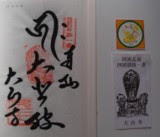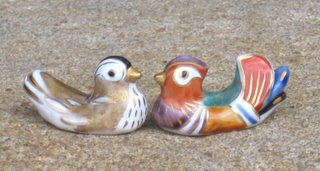:::::::::::::::::::::::::::::::::::::::::::::::::::::::::::::::::::::::::::::::::::::::::::::::::::::
Fudo Pilgrims in Shikoku
Temple Nr. 01 . Oyamadera (Ooyamadera) .
Daisanji . 大山寺
第1番 仏王山 大山寺 真言宗醍醐派
徳島県板野郡上板町大山 0886-94-5525
The main halls are in a deep forest and an Inner Sanctuary still further up the steep mountain.

Stamp of the temple
The main statue is a Kannon with 1000 Arms.
On the first Sunday in January the annual festival of "Strong men and Power Rice Cakes", chikara mochi 力餅 is celebrated. People have to carry the heavy rice cakes, which have been dedicated to Kannon during the New Year celebrations, in the temple garden and the one who can carry it the longest wins.
Men carry 169 kg, women 50 kg, first graders 45 kilo and small children 10 kg.

This festival is in memory of Lord Shichijoo Kanenaka 七条兼仲(しちじょうかねなか), a strong warlord in the times of Minamoto no Yoshitsune [1159~1189].
See below.
"Big Mountain Fudo", Taisan Fudo 太山不動
This Fudo is also one of the "Wave-cutting", Namikiri Fudo.
Kongara Doji 矜迦羅童子

© PHOTO : www.rokuriyu.or.jp
Mantra
on barasaki tattari sowaka
おん ばらさき たつたり そわか
CLICK for more photos of Kongara Doji !

At this temple, the powerful Kankiten is also venerated.
This elephant deity (Ganesh in India) is rather wild and it took a Kannon with its 1000 arms to appease it.
Kankiten 歓喜天 more details
This temple is between Nr. 5 and Nr. 6 of the Shikoku Pilgrimage to 88 Temples.
It is the first of the "Extra temples".
:::::::::::::::::::::::::::::::::::::::::::::::::::::::::::::::::::::::::::::::::::::::::::::::::::::
The BATTLE AT YASHIMA
Yashima Gassen 屋島合戦 ( やしまかっせん )
* Yashima is in the east of Takamatsu, which is one of the best-known ancient battlefields between the Heike and the Genji clans.
* The name Yashima means literally 'roof island'. Yashima, so called because of its shape like the roof of a traditional Japanese farm house, is a mesa headland jutting out into the Seto Inland Sea. But at the time when the Genpei War was fought, it was, as is implied by the name, an island separated from the mainland by the Aibikigawa River.
* The military forces of the Heikes, defeated at Ichinotani, retreated to Yashima with Emperor Antoku and set up his temporary court and their headquarters at Dannoura Inlet of Yashima. They still had powerful command of the whole Inland Sea area
* They simply expected their enemy would attack them by sea and concentrated their guard on the sea. They disposed their battle boats in the inlet and kept more than 500 boats in ambush behind a projecting land at Aji, on the other side of the inlet , now called Funakakushi, meaning 'boat hideout'. They prepared themselves thoroughly against an expected attack by the naval forces of the Genjis
* However in February 1185, the forces led by Yoshitsune outwitted them and instead of attacking them directly from the sea, crossed the sea to Awa (now Tokushima Prefecture)in no longer than six hours helped by a favorable wind. They marched all the way to Yashima by land overnight, which would have normally taken two days.
* The attack at the court from behind was so unexpected that the Heike battle boats rushed off the coast in a panic. The battle was fought not on the sea but on the coast, creating thousands of episodes including the death of Sato Tsugunobu sacrificing himself for Yoshitsune, Nasuno Yoichi's skillful shot at the fan, Yoshitsune's drop of his bow in the water and many others. Thus Yashima became one of the most colorful stages of the historic feud, leaving countless episodes.
* Yashima retains many names related to the historic battle. According to the stories, the main battlefield was the whole Dannoura area, where now stands Yashima-higashi Primary School. Visitors now find the old court site of Emperor Antoku, Tombs of Sato Tsugunobu and Kikuomaru, Rock on which Nasu no Yoichi prayed for success of his feat, Rock on which the bestriding Yoichi shot his arrow at the fan.
The place names of Genjigamine Peak, Funakakushi, Chinoike Pond and others are reminiscent of the past.
source : www.city.takamatsu.kagawa.jp

Photo : www.yoshitsune.info
:::::::::::::::::::::::::::::::::::::::::::::::::::::::::::::::::::::::::::::::::::::::::::::::::::
. . . . . . . . . . H A I K U

鳥渡る屋島の端山にぎやかに
tori wataru Yashima no hayama nigiyaka ni
migrating birds ...
over the hill of Yashima
it is quite bustling
Tr. Gabi Greve
Murao Ko-U 村尾公羽
野菊より霧立ちのぼる屋島かな
nogiku yori kiri tachinoboru Yashima kana
from the wild chrysanthemums
mist is ascending ...
Yashima Mountain
Tr. Gabi Greve
Tamura Toshiko 田村寿子
source : yahantei
:::::::::::::::::::::::::::::::::::::::::::::::::::::::::::::::::::::::::::::::::::::::::::::::::::::
Namikiri Fudo Wave-cutting Fudo 波切不動尊 、浪切不動明王
Yashima and Daruma Badgers (Tanuki)
四国三十六不動尊霊場会
Fudo Pilgrims in Shikoku
Alphabetical Index of the Daruma Museum
worldkigo
:::::::::::::::::::::::::::::::::::::::::::::::::::::::::::::::::::::::::::::::::::::::::::::::::::








6 comments:
Travels with Gabi san are always enjoyable.
Thank you, Gabi san!!
Chibi
Gabi san, I have not been to Yashima of which historical back ground is very famous.
And the place is very scenic .
I will expect your own haiku.
sakuo.
how the sky sits
on Yashima
clear day
much love
gillena
between the stones
on Yashima
wildflowers
grass along
the road to Yashima
sound of footsteps
Ella
*sighing and wishing it was close enough to visit
Thanks for visiting, my friends!
It is about 3 hours drive from my home and a phantastic history area indeed! I hope to be back there in autumn.
GABI
Nasu no Yoichi 那須与一
(c. 1169 – c. 1232)
.
Post a Comment